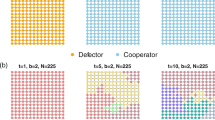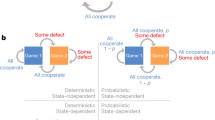Abstract
Understanding how cooperative behavior emerges within a population of autonomous individuals has been the focus of a great deal of research in biology, economics and more recently in the multi-agent systems domain. However, there are still many open questions. In this paper, we address some of these questions by investigating the effects of time-varying, non-symmetric rewards on the evolution of cooperation in the spatial Prisoner’s dilemma game. The rationale behind this approach is based on the notion that the associated payoffs from pursuing certain strategies do vary among members of real-world populations. In our model, agents with limited cognitive capacity play the game with their local neighbours. In addition to its game playing strategy, each agent has additional attributes that can be used to control the number of rounds of the game the agent actually participates in, as well as the magnitude of any rewards that it receives. Numerical simulations show that dynamic updates to payoff values induce a change in equilibrium cooperation levels. This suggests that heterogeneous payoff values and social diversity within a cost-benefit context are important factors in the promotion of cooperation in the spatial Prisoner’s dilemma game.











Similar content being viewed by others
References
Axelrod R (1984) The evolution of cooperation. Basic Books, New York
Lindgren K, Nordahl MG (1994) Evolutionary dynamics of spatial games. Physica D 75:292–309
Nowak MA, May RM (1992) Evolutionary games and spatial chaos. Nature 359:826–829
Nowak MA, Sigmund K (1992) Tit for tat in heterogeneous populations. Nature 355:250–252
Fort H (2008) On evolutionary spatial heterogeneous games. Physica A 173(1):1613–1620
Perc M, Szolnoki A (2008) Social diversity and promotion of cooperation in the spatial prisoner’s dilemma game. Phys Rev E 77:011904
Chong SY, Yao X (2006) Self-adapting payoff matrices in repeated interactions. Computational intelligence and games, IEEE symposium on, pp. 103–110
Santos FC, Pacheco JM (2006) A new route to the evolution of cooperation. J Evol Biol 19(3):726–733
Santos FC, Santos MD, Pacheco JM (2008) Social diversity promotes the emergence of cooperation in public goods games. Nature 454:213–216
Kagel JH, Roth AE (1995) The handbook of experimental economics. Princeton University Press, Princeton
Lave LB (1965) Factors affecting cooperation in the prisoner’s dilemma. Behav Sci 10:26–38
Boone C, De-Brabander B, van Witteloostuijn A (1999) The impact of personality on behavior in five prisoner’s dilemma games. J Econ Psychol 20:343–377
Johnson DP, Stopka P, Bell J (2002) Individual variation evades the prisoner’s dilemma. BMC Evol Biol 2(1):15
Turner PE, Chao L (2003) Escape from prisoner’s dilemma in RNA phage 6. Am Nat 161(3):497–505
Fort H (2008) A minimal model for the evolution of cooperation through evolving heterogeneous games. Europhy Lett 81(408):97–216
Tomochi M, Kono M (2002) Spatial prisoner’s dilemma games with dynamic payoff matrices. Phys Rev E 65(026112)
Nowak MA (2006) Five rules for the evolution of cooperation. Science 314:1560–1563
Axelrod R (1980) Evolution of cooperation. J Conflict Resolut 24:3–25
Wooldridge M (2002) An introduction to multiagent systems. Wiley, Chichester
Kraines D, Kraines V (1989) Pavlov and the prisoner’s dilemma. Theory Decis 26:47–49
Hauert C (2001) Fundamental clusters in spatial 2 × 2 games. Proc R Soc Lond B 268:761–769
Nowak MA, May RM (1993) The spatial dilemmas of evolution. Int J Bifurcat Chaos 3:35–78
Schweitzer F, Behera L, Muhlenbein H (2002) Evolution of cooperation in a spatial prisoner’s dilemma. Adv Complex Syst 5(2–3):269–299
Ohtsuki H, Hauert C, Lieberman E, Nowak MA (2006) A simple rule for the evolution of cooperation on graphs and social networks. Nature 441:502–505
Szabo G, Fath G (2007) Evolutionary games on graphs. Phys Rep 446(4–6):97–216
Clements KC, Stephens DW (1995) Testing models of non-kin cooperation: mutualism and the prisoner’s dilemma. Anim Behav 50:527–535
Wilensky U (2002) Modeling nature’s emergent patterns with multi-agent languages. In: Proceedings of EuroLogo, 2002. NetLogo is a cross-platform multi-agent programmable modeling environment. See http://www.ccl.northwestern.edu/netlogo/
Noë R, Hammerstein P (1994) Biological markets: supply and demand determine the effect of partner choice in cooperation, mutualism and mating. Behav Ecol Sociobiol 35:1–11
Author information
Authors and Affiliations
Corresponding author
Rights and permissions
About this article
Cite this article
Rezaei, G., Kirley, M. The effects of time-varying rewards on the evolution of cooperation. Evol. Intel. 2, 207–218 (2009). https://doi.org/10.1007/s12065-009-0032-1
Received:
Revised:
Accepted:
Published:
Issue Date:
DOI: https://doi.org/10.1007/s12065-009-0032-1




